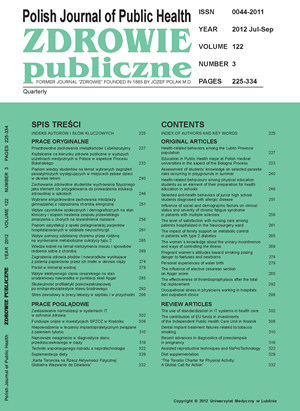Pregnant women’s attitudes toward smoking posing danger to foetuses and newborns
DOI:
https://doi.org/10.12923/j.0044-2011/122/3/a.10Keywords:
pregnant women’s attitudes, smoking, danger to foetuses and newbornsAbstract
Introduction. Smoking cigarettes is the most common addiction, also observed in women before and during pregnancy.
Aim. This study presents the attitudes of pregnant women towards smoking and the related risks to the foetus and the newborn.
Material and methods. The study was based on the author’s questionnaire and analysis of medical records.It was conducted in obstetric-neonatal units of three hospitals in Lublin, from July to September 2010.
Results. In the observed group, 64.5% women never smo-ked cigarettes. The remaining 35.5% admitted to the habit. Of the latter group 57.1% continued smoking during pregnancy, and 30 (42.9%) stopped. Cigarette smoking during pregnancy was statistically dependent (p<0.01) on marital status, education, profession and monthly family income per capita of the respondents. Smokers were significantly more often unmarried women, who did not work, with low income and vocational education, whereas age and the place of residence had no significance in this regard. Statistical analysis proved the existence of the correlation between women’s opinion on the role of the placenta in the protection of the foetus against tobacco smoke and smoking or not by the pregnant women. Significantly more often (p=0.000000) that was confirmed by the smokers. The collected data show that women smoking during pregnancy significantly more often (p=0.000000) believed that smoking while pregnant had no effect on the subsequent development of diseases in children.
Conclusion. Smoking during pregnancy is relatively common and it is related to women’s marital status, education, profession and monthly income per household member. Women smoking during pregnancy, significantly more often than non-smokers, believe that the placenta protects the child against the effects of tobacco smoke and deny the existence of any link between smoking and the occurrence of diseases in children.
References
1. www.pis.mswia.gov.pl: Program ograniczania zdrowotnych następstw palenia tytoniu w Polsce na lata 2008-2011. Cele i zadania.
2. Gilman S, Gardener H, Buka S. Maternal smoking during pregnancy and children’s cognitive and physical development: A causal risk factor? Am J Epidemiol. 2008;1:168(5):522-31.
3. Oken E, Levitan E, Gillman M. Maternal smoking during pregnancy and child overweight: systematic review and meta-analysis. Int J Obes. (Lond) 2008;32:201-10.
4. Stanisz A. Przystępny kurs statystyki z wykorzystaniem programu STASTISTICA, Wersja polska na przykładzie medycyny. Kraków: T.I. Wydawnictwo StatSoft; 2001.
5. Jagielska I, Kazdepka-Ziemińska A, Racinowski F, et al. Zjawisko nikotynizmu wśród ciężarnych. Palenie papierosów w ciąży a stan noworodka. Przegl Lek. 2007;64 (10):618-21.
6. Crozier S, Robinson S, Borland. Do women change their health behaviours in pregnancy? Findings from the Southampton Women’s Survey. Paediatr Perinat Epidemiol. 2009;23(5):446-53.
7. Durmus B, Lamise A, Hokken-Koelega A et al. Maternal smoking during pregnancy and subcutaneous fat mass in early childhood. Eur J Epidemiol. 2011;26(4):295-304.
8. Stroud L, Paster R, Goodwin M. Maternal smoking during pregnancy and neonatal behavior: a large-scale community study Pediatrics. 2009;123(5):842-8.
9. Al-Sahab B, Saqib M, Hauser G. Prevalence of smoking during pregnancy and associated risk factors among Canadian women: a national survey. BMC Pregnancy Childbirth. 2010;10:24.
10. Haskins E, Bertone-Johnson E, Pekow P, et al. Smoking during pregnancy and risk of abnormal glucose tolerance: a prospective cohort study BMC Pregnancy Childbirth. 2010;10:55.
11. Buja A, Guarnieri E, Giovanni Forza G. Socio-demographic factors and processes associated with stages of change for smoking cessation in pregnant versus non-pregnant women Matern Child Health J. 2010 July; 14(4): 501-10.
12. Weinberger A, McKee, George T. Changes in smoking expectancies in abstinent, reducing, and non-abstinent participants during a pharmacological
trial for smoking cessation Nicotine Tob Res. 2010;12(9):937-43.
13. Nomura Y, Marks P, Halperin J. Prenatal exposure to maternal and paternal smoking on attention deficit hyperactivity disorders symptoms and diagnosis in offspring J Nerv Ment Dis. 2010;198(9):672-8.
14. Kandel D, Griesler P, Schaffran CH. Educational attainment and smoking among women: risk factors and consequences for offspring Drug Alcohol Depend. 2009; 104(suppl. 1):S24-S33.


